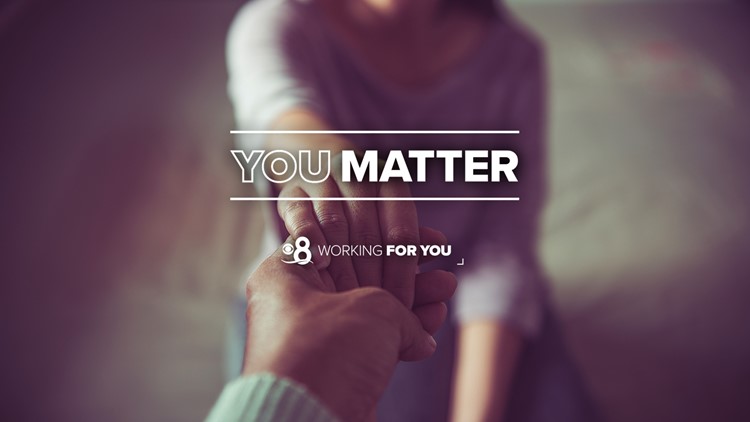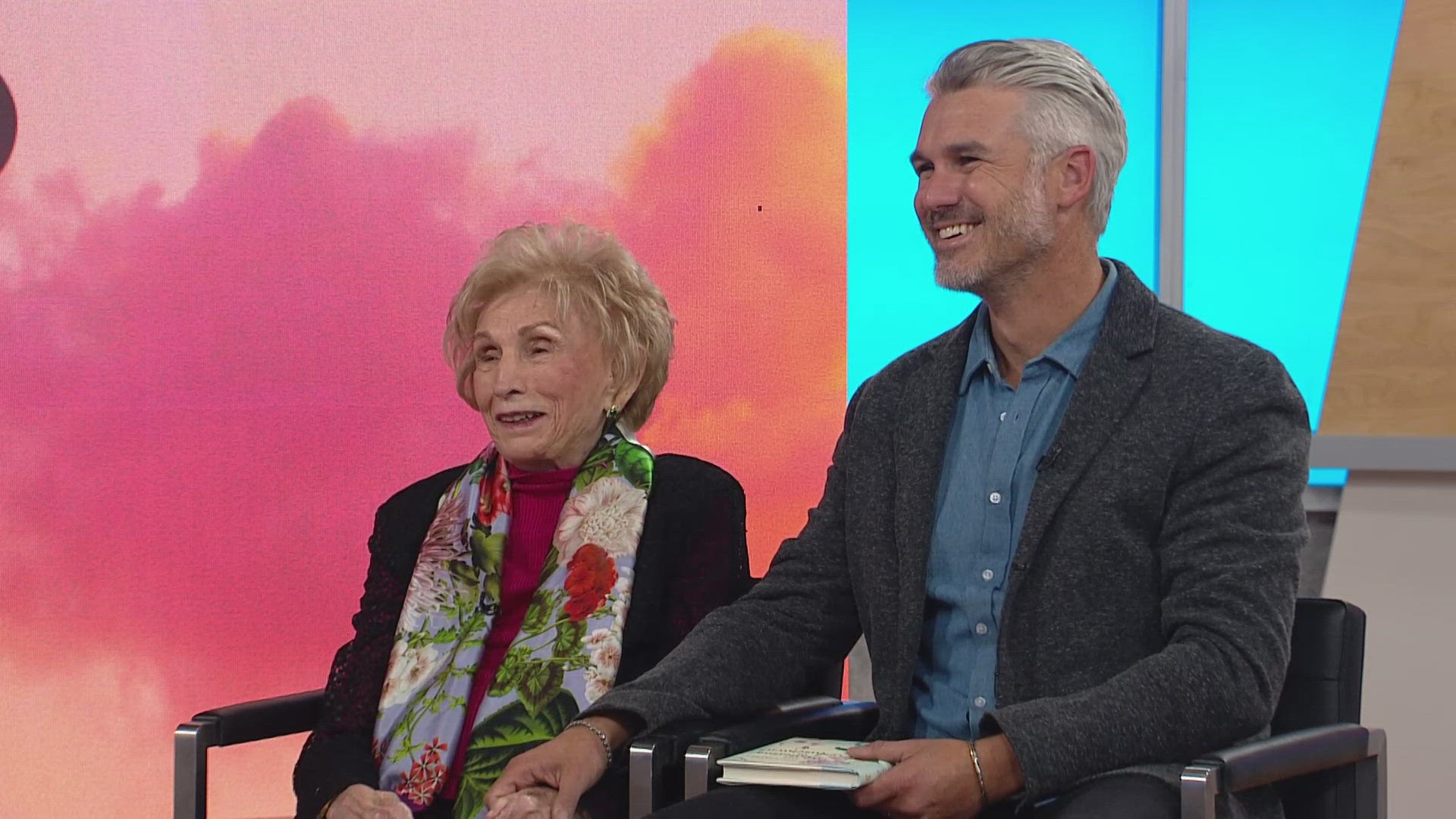SAN DIEGO COUNTY, Calif. — Below is a list of some of the mental health resources available in San Diego and nationally. This is not a complete list. If you have resources that you have used and would like to share with others, please send an email to workingforyou@cbs8.com.
Helplines, Websites and Resources
1) 988 Lifeline
The 988 Lifeline provides 24/7, free and confidential support for people in distress, prevention and crisis resources for you or your loved ones, and best practices for professionals in the United States.
Open 24/7.
Call, text or chat the number 988. También está disponible en Español, envía "AYUDA" al 988.
For the Veterans Crisis Line, dial 988 then press 1. You can also chat online or text 838255.
National HelpLine: 1-800-950-NAMI (6264) or info@nami.org.
The NAMI HelpLine is a free, nationwide peer-support service providing information, resource referrals and support to people living with a mental health condition, their family members and caregivers, mental health providers and the public.
Open Monday through Friday, from 7 a.m. to 7 p.m. PST.
For those in San Diego and Imperial County
Helpline: Toll Free – 800-523-5933, Local – 619-543-1434, open Monday through Friday, 9 a.m. to 5 p.m.
NAMI San Diego’s Helpline is a warm line for San Diego resources, which means that a trained Volunteer from NAMI will either be on the line or will contact you within 48 hours.
CalHOPE: 833-842-HOPE (4673), open Monday through Friday, 8 a.m. to 4 p.m. Available in both English and Español.
We offer a variety of resources. For example, we provide resources related to food, housing, utilities, career-related, legal, domestic violence, health, behavioral health (mental health, substance use), immigration, diaper distributions, positive parenting courses, groups, affordable childcare, youth centers, cooling centers, and much more!
Warmline: 619-295-1055, open 3:30 p.m. to 11 p.m.
The Warmline is a non-crisis phone service. The Warmline provides callers with information, referrals, support, and empathy. This service has become a valuable tool for individuals in the community who may be isolated or struggling with the symptoms of mental illness to seek comfort, coping skills, and the reassurance that they are being heard by someone who has “been there-done that”. The individuals taking calls are all trained Peer Support Specialists who have experience or personal knowledge of mental health issues, recovery and services.
24/7 Access and Crisis Line – 888-724-7240.
Live chat – click here.
The San Diego Access & Crisis Line (ACL) offers immediate support and resources from an experienced counselor on all behavioral health topics including suicide prevention, crisis intervention, community resources, mental health referrals, alcohol and drug support services, and more. Confidential and free of charge, the line is immediately answered 7 days a week, 24 hours a day by Master’s-level and Licensed Clinicians.
Outpatient services provide treatment, rehabilitation, and recovery services for people who are experiencing persistent and severe mental illness or a behavioral health crisis. Services include screening, assessment, medication management, crisis intervention, and group and individual short-term therapy. Programs also offer case management and homeless outreach.
Southeastern: 858-351-6000 – 5101 Market St, Suite 2300, San Diego, CA 92114
North Central: 619-692-8750 – 1250 Morena Blvd, 1st Floor, San Diego, CA 92110
East County: 619-401-5500 – 1000 Broadway, Suite 210, El Cajon, CA 92021
Crisis Stabilization Units, or CSUs, provide immediate mental health support and treatment services in a therapeutic setting to individuals in acute behavioral health distress who require urgent care beyond what an outpatient clinical service can provide.
CSUs can help to deescalate a person’s level of distress, prevent or treat a behavioral health crisis, and reduce acute symptoms of a mental health condition.
- Services are tailored to each person and are provided on a short-term basis, up to 24 hours, and include crisis intervention, mental health assessment, medication assistance, therapy, and peer support.
- CSUs are designed to be relaxing and quiet, with a calming environment to support mental wellness.
- The goal is to connect to ongoing care and divert from higher levels of care.
See the Frequently Asked Questions section for more information on behavioral health crises.
- If you or someone you know might be having a psychiatric emergency or behavioral health crisis, call the Access and Crisis Line at 1-888-724-7240 to speak with a licensed, behavioral health professional. Calls are answered 24/7, are confidential, and always free. Interpreter services are available in over 200 languages.
Who can receive services at a County of San Diego CSU?
The County of San Diego offers crisis stabilization services to children and adults at various locations countywide, see section below for more detail. County CSUs generally serve individuals who are Medi-Cal eligible, uninsured, or very low income and who are experiencing a psychiatric emergency.
If you have any questions, contact your primary insurer or reach out directly to any of the CSU locations listed below.
Located in Hillcrest, Vista, Oceanside, Escondido, Midway, Chula Vista and El Cajon.
It’s Up to Us is about helping San Diegans talk openly about mental health, recognize signs of challenges, find local resources, and seek support. We aim to inspire wellness, reduce stigma, and prevent suicide.
Open 24/7 – Crisis Line (888) 724-7240.
Crisis Line: 888-724-7240.
Chat – available Monday through Friday, 4 p.m. to 10 p.m.
The program, Helping, Engaging, Reconnecting and Educating (HERE)
Now, focuses on increasing awareness, promoting conversations and
inspiring connections to prevent suicide—one community, one school,
one life at a time.
In collaboration with North County Lifeline and South Bay Community
Services, HERE Now is now active in 76 schools in 22 school districts in
San Diego County, creating a safer place to learn with suicide and bullying prevention education for 7th to 12th graders.
Can call 2-1-1 or email 211help@211sandiego.org for help. 211 San Diego is a free, 24 hour confidential phone service and searchable online database.
7) Crisis Text Line
Text “HOME” to 741741. You can also chat online or through WhatsApp.
Call 866-488-7386, text 'START' to “678-678” or chat online at thetrevorproject.org
The Trevor Project is the world's largest suicide prevention and crisis intervention organization for lesbian, gay, bisexual, transgender, queer, and questioning (LGBTQ) young people.
The free and confidential resources below can help you or a loved one connect with a skilled, trained mental health professional.
Need Support Now?
If you or someone you know is struggling or in crisis, help is available. Call or text 988 or chat 988lifeline.org
Disaster Distress Helpline: CALL or TEXT 1-800-985-5990 (press 2 for Spanish)
Abuse/Assault/Violence
National Domestic Violence Hotline: 1-800-799-7233 or text LOVEIS to 22522
National Child Abuse Hotline: 1-800-4AChild (1-800-422-4453) or text 1-800-422-4453
LGBTQ+
Trans Lifeline: 1-877-565-8860 (para español presiona el 2)
The Trevor Project’s TrevorLifeline: 1-866-488-7386
Older Adults
The Eldercare Locator: 1-800-677-1116 – TTY Instructions
Alzheimer’s Association Helpline: 1-800-272-3900 (para español presiona el 2)
Veterans/Active-duty Military
Veteran’s Crisis Line: 988, then select 1, or Crisis Chat or text: 838255
Finding Treatment
FindTreatment.gov – Find a provider treating substance use disorders, addiction, and mental illness.
American Psychiatric Association Foundation – Find a Psychiatrist
American Academy of Child and Adolescent Psychiatry – Child and Adolescent Psychiatrist Finder
American Psychological Association – Find a Psychologist
Opioid Treatment
MORE RESOURCES FOR SELECTING A MENTAL HEALTH PROFESSIONAL:
Mayo Clinic: Mental Health Providers: Tips on finding one
NIH - National Institute of Mental Health: Finding a Therapist
SENIORS:
MILITARY:
USO San Diego
County of San Diego – Military and Veterans Resources and Guidance
Aurora Behavioral Health Care – Military Resources
UP2SD Military Resources
The Steven A. Cohen Military Family Clinic
Depression is more than just feeling down or having a bad day. When a sad mood lasts for a long time and interferes with normal, everyday functioning, you may be depressed. Symptoms of depression include:1
- Feeling sad or anxious often or all the time
- Not wanting to do activities that used to be fun
- Feeling irritable‚ easily frustrated‚ or restless
- Having trouble falling asleep or staying asleep
- Waking up too early or sleeping too much
- Eating more or less than usual or having no appetite
- Experiencing aches, pains, headaches, or stomach problems that do not improve with treatment
- Having trouble concentrating, remembering details, or making decisions
- Feeling tired‚ even after sleeping well
- Feeling guilty, worthless, or helpless
- Thinking about suicide or hurting yourself
Occasional worry is a normal part of life.
Many people worry about things such as health, money, or family problems. But usually, the worry goes away.
When worry lasts for 6 months or longer—even in the absence of life changes— and interferes with daily activities, such as job performance, schoolwork, and relationships, it may be an anxiety disorder.
If you’re worrying a lot and the worrying becomes hard to control, you should get help from a professional. This is especially true if you also have any of the physical symptoms below.
Symptoms of anxiety include:
- Feeling restless, agitated, or on edge
- Getting tired easily
- Having trouble concentrating
- Feeling irritable
- Experiencing muscle tension or knots
- Trouble sleeping, including falling or staying asleep
If you have several of these symptoms more days than not for at least 6 months and you have a hard time controlling your worry, you should talk to a health care provider.
INFORMATION ABOUT LONELINESS:
CDC
Sharp Healthcare
Psychology Today
Note: The information in this story is intended to be a resource. These sources are not an endorsement or recommendation by CBS 8. If you have additional questions or concerns, talk with a doctor or medical professional.



